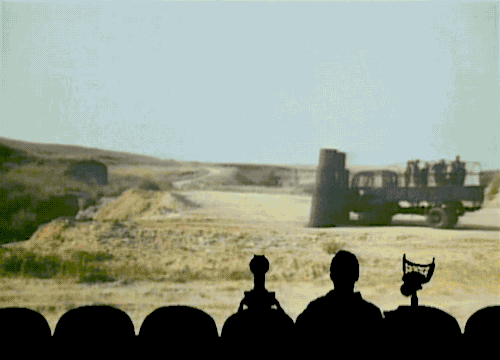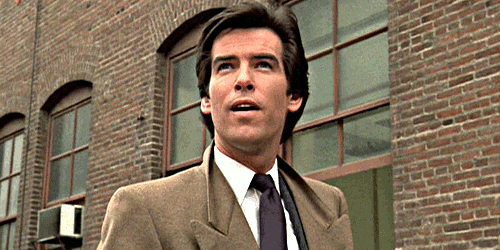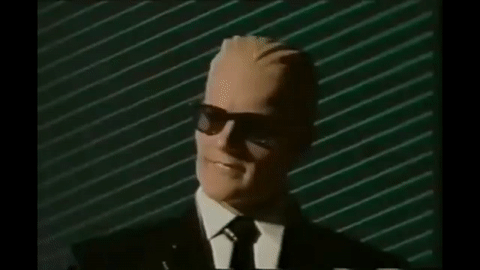MacGYVER YOUR ENTHUSIASM (INTRO)
By:
January 1, 2025

This Fall, I invited 25 HILOBROW regulars and friends to contribute to an “enthusiasm” series dedicated to scripted TV shows and cartoons from the cultural decade known as the Eighties (c. 1984–1993, in HILOBROW’s infamous periodization scheme).
MacGYVER YOUR ENTHUSIASM would be a sequel, I announced, to TUBE YOUR ENTHUSIASM (1954–1963 TV shows), FIVE-O YOUR ENTHUSIASM (1964–1973 TV shows), and KOJAK YOUR ENTHUSIASM (1974–1983 TV shows). As with these previous series, hate-watching would be verboten. “Please propose a show that you either truly enjoyed at the time,” I urged, “or have come to appreciate in a new way since.”
I’m thrilled with the MacGYYVER lineup:
Michael Grasso on MAX HEADROOM | Heather Quinlan on MYSTERY SCIENCE THEATER 3000 | Mark Kingwell on CHINA BEACH | Judith Zissman on SANTA BARBARA | Adelina Vaca on TEENAGE MUTANT NINJA TURTLES | Deborah Wassertzug on MOONLIGHTING | Josh Glenn on VOLTRON | Adam McGovern on A VERY BRITISH COUP | Alex Brook Lynn on STAR TREK: THE NEXT GENERATION | Nikhil Singh on CHOCKY | Sara Ryan on REMINGTON STEELE | Vanessa Berry on THE YOUNG ONES | Dan Reines on GET A LIFE | Susannah Breslin on PEE-WEE’S PLAYHOUSE | Marc Weidenbaum on LIQUID TELEVISION | Elina Shatkin on PERFECT STRANGERS | Lynn Peril on THE SIMPSONS | David Smay on THE DAYS AND NIGHTS OF MOLLY DODD | Annie Nocenti on THE SINGING DETECTIVE | Tom Nealon on MIAMI VICE | Anthony Miller on ST. ELSEWHERE | Gordon Dahlquist on BLACKADDER | Peggy Nelson on SEINFELD | Nicholas Rombes on TWIN PEAKS | Ramona Lyons on ÆON FLUX
PS: Here are a few other shows I would have also liked to include: IT’S GARRY SHANDLING’S SHOW | THE WONDER YEARS | 21 JUMP STREET | DOOGIE HOWSER M.D. | SHE-RA | THE TRACEY ULLMAN SHOW | THE GOLDEN GIRLS | MARRIED… WITH CHILDREN | BAYWATCH | MURPHY BROWN | SUPER DAVE. And, obviously: MACGYVER.
The MACGYVER YOUR ENTHUSIASM series kicks off tomorrow. Enjoy!

A funny thing happened, as I set about recruiting contributors to this series. Several HILOBROW stalwarts who belong either (as I do) to the Reconstructionist Generation (1964–73). or else to the Original Generation X (1954–63), replied to my request for proposals with non-apology apologies.
“I didn’t have a television through most of that period, and saw hardly any of these shows,” was a typical response. “If I watched anything at all [after I went to college in 1986] it was MTV,” another person more or less my exact age recounted, “or reruns (on cable TV — which I didn’t have access to before then) of all the shows I’d missed.”
Yeah, once upon a time, when one graduated high school or college, one stopped watching TV — until we settled down. A person in their early 20s didn’t necessarily even own a TV, in those pre-streaming days. And even if there was a TV in your dorm, as the person I quoted above notes, we’d mostly watched cable: MTV, primarily, plus catching up on older shows. Me, I spent far too much of freshman year catching up on episodes of The White Shadow.
Also, even if we did have access to a TV in those days, we (and by “we” I’m referring to those of us with a shared sensibility) didn’t necessarily choose to watch what was coming out at the time. “I guess I didn’t watch much TV in the ’80s — which makes sense, I guess, because in that decade I was finishing high school and going to college and starting out postcollegiate life in New York and then starting grad school,” another refusenik told me, offering at first a purely functional excuse. “Maybe a rerun or two, but pretty much nothing in prime time.” When I replied to say that I fully understood, they added, in a more qualitative vein: “TV was also extra-boring in the ’80s. Not worse, but also not heroically or interestingly bad. Just nothing on.”

It’s worth quoting, at this juncture, the satirical 1981 Black Flag song “TV Party” (Emilio Estevez’s character sings it, at one point in the 1984 movie Repo Man): “We’ve got nothing better to do / Than watch TV and have a couple of brews / Don’t talk about anything else / We don’t want to know / We’re dedicated to our favorite shows / That’s incredible! / Hill Street Blues! / Dallas!” etc. That was pretty much attitude of my alt-culture cohort and our immediate elders.
So it took more doing to pull this enthusiasm series together then it normally does. Fortunately, there are HILOBROW writers who were in middle school and high school during the Eighties; also, as the lineup above indicates, there were in fact a few truly interesting shows on the air then. Below, you’ll find a few notes about themes I’ve spotted emerging from the series’ installments.
EDUCATIONAL

Television — not just “educational television” — has much to teach the curious young person. Writing about Mystery Science Theater 3000, for example, documentary filmmaker Heather Quinlan reminisces: “I learned more [about, for example, foreign films and “bad” movies] from any given season of MST3K than I did in a semester of college — and enjoyed it way more too.” By watching Blackadder, future novelist and playwright Gordon Dahlquist discovered that the best of British comedy, “precisely because of the smaller stakes and less financial risk, can plow a narrower furrow of subject matter, indulge a weirder sense of humor, and generally push the margins of what might expect to have popular appeal.” Future philosophy professor Mark Kingwell, meanwhile, remembers contrasting Heidegger’s dictum that “the world worlds” with what he was learning at the same time via the show China Beach: “In war, the world unworlds. A lot.”
AFFIRMING & MOTIVATING

Despite the scorn we felt, in those days, for the TV-addicted “couch potato” (a c. 1976 pejorative slang term popularized in the early ’80s), for some of us TV-watching was not only an affirming but motivating experience. “I remember something moving inside me as I watched [Twin Peaks],” writes Nicholas Rombes, “a subtle awakening that’s still happening.” The show Moonlighting, which referenced Hitchock and 1940s noir, recalls Deborah Wassertzug, “helped to normalize my otherwise isolating cultural history exploration.” And in their essay on Remington Steele, Sara Ryan remembers that “in one of the classic queer identity clichés, I wanted them (both), and wanted to be them (both).”
What ought one to become? Writing about The Singing Detective, Annie Nocenti notes that the brilliant British series “urges the viewer to crack the mystery of self — before it’s too late.” Susannah Breslin, a devotee of Pee-Wee’s Playhouse, remembers discovering: “This was a person letting his freak flag fly and encouraging everyone else to do the same. It was hard to resist him, to not want to be him.” And in revisiting the British sci-fi show Chocky, Nikhil Singh notes that the titular alien invader embodies “aspects of a positive human archetype — embodying an eagerness to learn, cohabit symbiotically, question standards and above all — evolve.”
The appeal of some Eighties TV lay in its truth-telling about who we are. Writing about the early Simpsons episodes, Lynn Peril enthuses: “It was shocking, funny, and familiar (I grew up with open caskets and lots of yelling). I loved it.” Others were drawn to TV’s fantastical depiction of everything we weren’t. “The story lines are more soapy, more recycled, somehow both more preposterous and less surreal,” future Californian Judith Zissman recalls about the soap opera Santa Barbara. “But still, there’s that beautiful California sky, the light that promises something shimmering in the distance, if only you can get there.” Tom Nealon, who’d watch Miami Vice right after ballroom dancing lessons, agrees: “Inside that Episcopalian church we were stuck in the ’50s, but the ’80s were happening right afterwards… and they were moody and violent, sexy and dangerous.”
PRESCIENT

When it comes to some of the future visions offered to us by Eighties TV, we’re still playing catch-up. “In three-plus decades since then, the world has caught up to Chris Elliott’s antisocial brand of charm,” writes Dan Reines about Get A Life. “And so have I.” Revisiting Max Headroom, meanwhile, Michael Grasso points out that “Max himself, in his multiplicity of roles as a commercial pitchman, unctuous talk-show host, and ostensible deuteragonist of this dystopian series, is a literal avatar of TV’s ability to forgive itself….” For Elina Shatkin, the comedy Perfect Strangers, on which Bronson Pinchot plays an eastern European immigrant, is an indicator of how far we’ve regressed: “In Trump’s America, where immigrants are demonized as violent, cat-eating criminals and Nuremberg-esque crowds chant ‘mass deportation,’ it’s hard to remember that the United States once prided itself on welcoming the huddled masses.”
Eighties TV could even be utopian, at times. Writing about A Very British Coup, Adam McGovern notes: “Coup becomes a kind of utopian procedural, fascinatingly showing how this struggle might play out while offering zero illusions about how easy or achievable victory might be.” In a somewhat less world-historical vein, David Smay recalls that in The Days and Nights of Molly Dodd you can catch glimpses of “a boho-lite world floating on the periphery of publishing, museum dates, bodega flowers and tidy obsessions with Dawn Powell or The Waverly or Sondheim.” The show — and the Eighties in general — was “a magical alternative timeline with arts funding that allowed a jazz musician to score a show at the planetarium.”
JACK KIRBY PANELS | CAPTAIN KIRK SCENES | OLD-SCHOOL HIP HOP | TYPEFACES | NEW WAVE | SQUADS | PUNK | NEO-NOIR MOVIES | COMICS | SCI-FI MOVIES | SIDEKICKS | CARTOONS | TV DEATHS | COUNTRY | PROTO-PUNK | METAL | & more enthusiasms!
